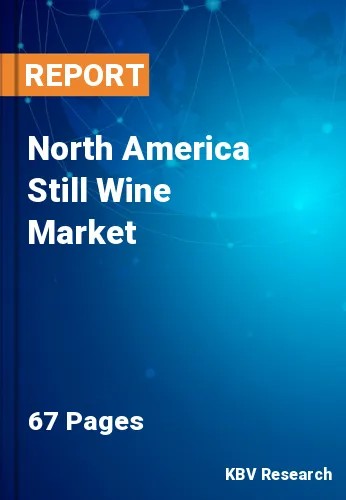The North America Still Wine Market would witness market growth of 9.1% CAGR during the forecast period (2022-2028).
Wine is an alcoholic beverage prepared primarily from grapes and eaten directly, with some cooking and religious rites thrown in for good measure. Many people are switching from beer and spirit-based drinks to still wine as their lifestyles change and they become more aware of the health benefits of wine. Because beer has 1.3 times the number of calories as wine, many calorie and health-aware consumers are switching from beer to wine. The still wine is made by allowing the juices of freshly plucked grapes to ferment naturally. Both white and black grape juice is colorless. The skin is detached either after the wine has finished fermenting or when the appropriate hue has been achieved.
The fermentation procedure must occur spontaneously as a result of the reaction of the yeasts that transform the must into wine. consequently, the creation of this type of wine does not result in enormous amounts of carbon dioxide gas. These wines do not produce bubbles because they contain a low concentration of carbonic gases. They also have an alcohol content that ranges from 8.5% to 14%. Astonishingly, the majority of these wines are still available.
The production, as well as the consumption of wine, is majorly high in this region. There is a significant number of wineries in the United States, with California accounting for a considerable quantity of total wine output. Despite the fact that the bulk of premium wine consumers in the country are the baby boomers, increased interest among millennials is causing a shift in the target customer group, which would play a vital role in boosting the country's wine market growth. The consumption of wine is greater in millennials than any other generation.
In addition, according to the National Association of America Wineries, the United States, Grapes are one of the highest valued fruit crops with the production reaching $6.5 billion. In addition, 36% of the non-citrus fruits’ value across the country is from grapes. The country also possesses approximately 1-million-acre grape-bearing land. Moreover, in 2018, the production of grapes in the United States reached more than 7,500,000 tons. Due to the higher yield of grapes, the production and consumption of wine in the country are also rising. According to the organization, in 2017, the country produced more than 900,000,000 gallons of wine, which accounts for 12% of the worldwide production of wine.
The US market dominated the North America Still Wine Market by Country in 2021, and would continue to be a dominant market till 2028; thereby, achieving a market value of $123,079.5 million by 2028. The Canada market is estimated to grow at a CAGR of 11.6% during (2022 - 2028). Additionally, The Mexico market would witness a CAGR of 10.6% during (2022 - 2028).
Based on Distribution Channel, the market is segmented into Liquor Stores, Internet Retailing, Supermarkets, Pub, Bars & Restaurants, and Others. Based on Type, the market is segmented into Red Wine, White Wine, and Others. Based on countries, the market is segmented into U.S., Mexico, Canada, and Rest of North America.
Free Valuable Insights: The Global Still Wine Market is Estimated to reach $505.1 Billion by 2028, at a CAGR of 9.7%
The market research report covers the analysis of key stake holders of the market. Key companies profiled in the report include Constellation Brands, Inc., The Wine Group, E. & J. Gallo Winery, Diageo PLC, Pernod Ricard S.A., Treasury Wine Estates Limited, Trinchero Family Estates, CASTEL Familial et international, Zhang Yu Wine Company, and Casella Wines Pty Limited.
By Distribution Channel
By Type
By Country
Our team of dedicated experts can provide you with attractive expansion opportunities for your business.

